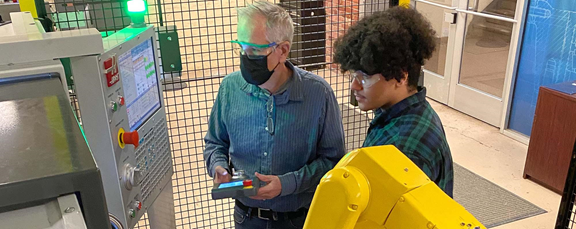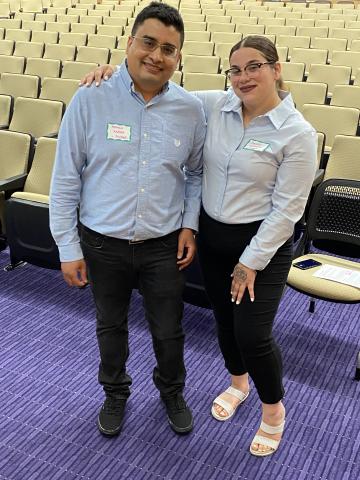
The manufacturing skills gap in the U.S. could result in 2.1 million unfilled jobs by 2030, according to a study by The Manufacturing Institute and Deloitte. Finding workers with the right skills has been one of the biggest challenges in the manufacturing sector for more than a decade.
Manufacturing has long been a driver of innovation and economic growth in the U.S. Now, as advanced manufacturing evolves with new careers involving robotics, automation and AI, workforce development has taken on increasing importance. The manufacturing sector increasingly needs workers with science, technology, engineering, and mathematics (STEM) skills to program and operate complex machinery, and conduct research and development.
The Manufacturing USA® network has successfully accelerated technology and scale-up, and supported small and medium-sized manufacturers to gain access to opportunities, and built out unique advanced manufacturing ecosystems. The network’s large-scale public-private collaboration is being employed in scores of projects to expose students of all ages to STEM careers and equip workers with the necessary skills in advanced manufacturing in robotics, automation, and AI.
Each of the 16 institutes in the network has significant STEM-related workforce development initiatives. The unique breadth and diversity involving the institutes and their stakeholders make it possible for the Manufacturing USA network to understand and frame future work requirements. They are empowering the next generation to become the STEM workforce needed to strengthen the U.S.’s global economic competitiveness.
Programming Spans All Ages and Includes Underrepresented Populations
The workforce initiatives across the Manufacturing USA network span ages from K-8, high school, and college to post-graduate and mid-career development. Programs include summer camps, internships, apprenticeships, and fellowships.
Many of the programs are competency-based versus traditional time-based learning, allowing for more individualized curricula and targeting specific skills. Competency-based programs usually result in higher engagement because you only spend as much time on a task or subject as you need to achieve competency. Flexibility also has expanded the pool of participants, an important consideration for under-resourced communities for whom traditional classroom programs may pose attendance challenges due to lack of transportation, housing insecurity, and time constraints resulting from work or parenting demands.
Here is a look at some of the many workforce initiatives hosted by institutes in the Manufacturing USA network aimed at attracting STEM talent into the advanced manufacturing sector.
AFFOA: Advanced Fibers and Textiles
AFFOA has STEM-related programs across the education spectrum, from K-8 in Massachusetts and Rhode Island to technical high schools and community colleges in New England. Its MITxFIT program just completed a fourth Advanced Fibers and Fabrics Workshops bringing together undergraduate teams from the Massachusetts Institute of Technology and the Fashion Institute of Technology to take on an industry challenge. AFFOA has finalized a transdisciplinary and innovation playbook that provides information on how to scale the program.
AIM Photonics: Integrated Photonics
AIM Photonics has a variety of STEM-related projects and programs through the AIM Academy, which ladder up to degree and graduate-level programs at 11 universities and certification programs at four of them. One program is a three-day bootcamp of intensive hands-on learning for high school students. One boot camp is held at Massachusetts Institute of Technology and another is at the Rochester Institute of Technology.
AmericaMakes: Additive Manufacturing
AmericaMakes engages in STEM efforts “from K to gray.” Their programming begins with a Girl Scout patch and extends via various programs through every educational level and into career paths. Their AMNation Pipeline Portal is an interactive 3D printing program for middle schoolers. It features 11 microlearning modules so students can start creating their own designs. They will also find cybersecurity tips and modules to keep them safe along the way.
ARM Institute: Advanced Robotics
The ARM Institute did some heavy lifting along with its partners to create RoboticsCareer.org, the most advanced platform of industry-vetted training programs for high-value robotics careers in manufacturing with more than 13,000 programs from almost 2,500 education providers in the U.S. The platform supports education seekers, education providers and employers. Close to 20 programs have been approved for the ARM-endorsed badge.
BioFabUSA: Regenerative Manufacturing
BioFabUSA has seven STEM talent initiatives that span ages from Girl Scouts to university level and include annual contests and events. One program is BIOTREK, a project-based learning program for high school students that includes engagement with advanced technologies, the principles of entrepreneurship, and field trips to expose students to the advanced manufacturing sector.
Photonics Training Program Has 100% Placement Rate
AIM Photonics partners with Stonehill College and Bridgewater State University on the Advanced Manufacturing & Integrated Photonics Technician Certificate program. The one-year program, with three evening classes a week, helps people acquire knowledge applicable to advanced manufacturing, including electronics, robotics, optics, and photonics, even if they do not have a math or science background. Recent classes have had a 100 percent success rate in placing students in professional internships and jobs at top manufacturing and photonics companies.
Claudia Cabrera is an example of how the program has produced Industry 4.0 workers from non-traditional backgrounds. Her education took a backseat when she gave birth to twins, and after she earned a GED she was accepted into the photonics technician certification program. She endured housing insecurity at the onset of the COVID-19 pandemic, but the flexibility and resources available helped her complete the program. She now works at Sheaumann Laser, a high-tech manufacturing company.

BioMADE: Bioindustrial Manufacturing
BioMADE has more than a half dozen projects focused on STEM talent, including an afterschool program in Worcester, Mass., that could serve as a template for nationwide implementation. Another program focuses on college freshmen at the University of Texas in Austin and Austin Community College. This program leverages local biotechnology certification in partnership with local biomanufacturing companies to expose students to relevant topics, develop needed skills, and build pathways to internships as they sort through career options.
CESMII: Smart Manufacturing
CESMII recently completed two projects with STEM talent in mind — one oriented toward educational institutions and the other focused on manufacturers. The Factory 4.0 Educational Toolkit aims to address how the rapid pace of technology development has left educational systems scrambling to adapt learning outcomes, resulting in inadequate preparedness and readiness of the workforce at all levels. The toolkit’s platform can be integrated into education modules for labs, projects, and more. The Smart Manufacturing Workforce Development Model addresses the lack of tools available to assess a business’s readiness to adopt smart manufacturing technologies and the availability of corresponding education and training programs across the country.
CyManII: Cybersecurity in Manufacturing
CyManII is establishing their TrustWork Education nationwide platform to provide cybersecurity education, training and certifications for the workforce and manufacturing in all sectors. They also are building the Texas Manufacturing x Transformation Hub (TxMx Hub), a $5 million facility funded by the state of Texas to focus on using STEM talent to reach Texas manufacturers in critical sectors such as aerospace, computer hardware, advanced manufacturing, robotics, automobiles, and electric vehicles.
IACMI: Advanced Composites
IACMI has placed more than 100 students into internships at more than 40 member companies. The internships range from 10 weeks to year-long appointments. The institute also has the Advanced Composites Career Pathway program, which is developing a learning network with a national standard curriculum that can be implemented regionally. A new program serving K-12, SkillCrafters, is a multi-week program focused on engaging students with education and career pathways in entrepreneurship and technology, emphasizing advanced manufacturing and advanced composites.
LIFT: Lightweight Materials
LIFT has three programs for attracting STEM talent. The IGNITE Mastering Manufacturing program is a three-year curriculum that introduces students to advanced manufacturing materials, processes, and systems through online, multimedia and project-based learning. The LIFT Learning Lab is an immersive learning facility that prepares students for the most in-demand manufacturing careers – including on-site certification courses in welding, CNC machining and robotics. Operation Next is an advanced manufacturing certification program for military members in their final six months of service, and it has recently been expanded to include civilians.
MxD: Digital Manufacturing
MxD is collaborating with other Manufacturing USA institutes through its program, MxD Learn, to test a three-year digital manufacturing curriculum and develop a separate four-week awareness program for high school students. MxD Learn also contributed two modules to America Makes’ AMNation Pipeline Portal for middle schoolers.
NextFlex: Flexible Hybrid Electronics
NextFlex has a variety of talent programs. One is FlexFactor, an outreach, recruitment, and STEM education program designed to familiarize K-12 students with advanced manufacturing technology and entrepreneurship. Another is Flex2Future, a work-based learning program designed to allow colleges to easily integrate on-the-job training.
NIIMBL: Biopharmaceutical Manufacturing
NIIMBL conducts several programs, one of which is the highly successful NIIMBL eXperience. It provides African American/Black, Latinx, and Native American freshman and sophomores at Historically Black Colleges and Universities and NIIMBL member institutions an exclusive in-person, all expenses paid immersion program designed to introduce them to biopharmaceutical careers. The program is in its fourth year, and past graduates have gone on to secure internships at the world’s leading biopharmaceutical manufacturing companies including Merck, Genentech, Millipore Sigma, and Eli Lilly.
Power America: Wide Bandgap Semiconductors
Power America has a rolling call for proposals for undergraduate students from their 17 university members. The students, with the guidance of academic and industry advisors, receive a $4,000 scholarship to pursue a technical project related to wide bandgap semiconductor technology that they can present to members, providing both an educational experience and an opportunity to interact with high-profile potential employers.
RAPID: Modular Chemical Process Intensification
RAPID conducts a 10-week internship program for its member institutes three times per year that provides virtual training and leadership development opportunities. RAPID also runs an annual ChemE Cube competition for undergraduate university teams. Five teams competed in the inaugural event in November 2021. Each team designed, built and demonstrated a one-cubic foot water purification system, pitched their product to a panel of industry judges, and created a video highlighting their innovation.
REMADE: Sustainable Manufacturing
The REMADE Academy takes an industry-focused approach to its STEM recruitment efforts through online webinars, short courses, boot camps and multiple certificate pathways. Each pathway has three levels of training – awareness, practitioner, and expert – allowing U.S. manufacturing companies and their workforce to access training that is right for them.
Collaboration Model Is in Full Force for STEM Talent Initiatives
The Manufacturing USA network is leading the way in developing the STEM workforce needed to grow the advanced manufacturing sector. The institutes collaborate not only with major universities and private sector companies but also with community colleges, local nonprofits, education groups, state governments, and youth groups such as the Girl Scouts.
In 2021, institutes in the Manufacturing USA network collectively worked with over 2,300 member organizations to collaborate on more than 700 major research and development projects and engaged over 90,000 people in building workforce knowledge and skills in advanced manufacturing. State, industry, and federal funds contributed $480 million to these activities.
To learn about the many ways to engage with the hundreds of programs providing access to STEM education and skill-building, visit the Institutes’ page.

